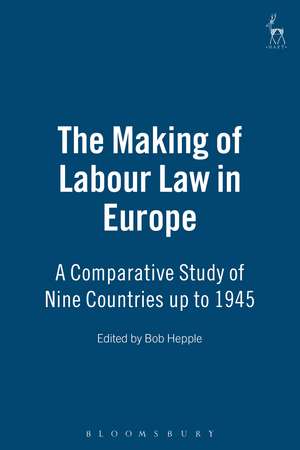The Making of Labour Law in Europe: A Comparative Study of Nine Countries up to 1945
Editat de Sir Bob Heppleen Limba Engleză Paperback – feb 2010
Preț: 541.38 lei
Preț vechi: 629.51 lei
-14% Nou
Puncte Express: 812
Preț estimativ în valută:
103.59€ • 112.88$ • 87.29£
103.59€ • 112.88$ • 87.29£
Carte tipărită la comandă
Livrare economică 23 aprilie-07 mai
Preluare comenzi: 021 569.72.76
Specificații
ISBN-13: 9781841138206
ISBN-10: 1841138207
Pagini: 248
Ilustrații: 1
Dimensiuni: 156 x 234 x 12 mm
Greutate: 0.6 kg
Editura: Bloomsbury Publishing
Colecția Hart Publishing
Locul publicării:London, United Kingdom
ISBN-10: 1841138207
Pagini: 248
Ilustrații: 1
Dimensiuni: 156 x 234 x 12 mm
Greutate: 0.6 kg
Editura: Bloomsbury Publishing
Colecția Hart Publishing
Locul publicării:London, United Kingdom
Notă biografică
Bob Hepple is Emeritus Master of Clare College and Emeritus Professor of Law, University of Cambridge.
Cuprins
Introduction by Bob HeppleAims, Methods and ScopeThe 'Social Question' and the Emergence of Labour LawEconomic Development and IndustrialisationThe Modernisation of the StateThe Character of the Employers' and Labour MovementsIdeology and the Growth of Legal Rationality in Labour Relationships1 The Evolution of the Contract of EmploymentBruno VenezianiIntroductionThe Removal of Restrictions on Freedom of ContractFreedom of Movement, the Right to Work and the Right of AssistanceThe Guild SystemApprenticeship in the Guild SystemPenal Law and the New Social OrderThe Work-Book and Penal SanctionsBreach of Contract and Private LawSome Pre-Industrial RemnantsDomestic ServantsAgricultural LabourersPublic ServantsLocatio Conductio and the Contract of ServiceFrom Status to ContractThe Evolution of the Location Conductio Model in the Civil Law SystemsThe Contract of Service in EnglandFreedom of Contract and the New Conception of Labour LawInequality of the Contracting PrinciplesThe Notion of SubordinationThe New Conception of the Contract of Employment Conslusions2 Laissez-faire and State Protection of WorkersThilo RammLaissez-faire and State ProtectionThe Model: British Protective Legislation until the First World WarProtection for Special Groups of Workers in Other CountriesChildren and Young PersonsWomenDisabled PersonsHome-workersThe Protection of All WorkersProtection of WagesSafety and Health StandardsThe Length of the Working DayThe Development of State InspectionGeneral Observations3 Welfare Legislation and Wage-LabourBob HeppleIntroduction The Impact of the Industrial RevolutionThe Old System of Poor ReliefThe Economic and Social Consequences of IndustrialisationThe Ideology of Liberalism and IndividualismThe New Relief SchemesThe Civil Liability of the Employer for Accidents and SicknessMutual AidThe Bismarckian Reforms in GermanyThe Economic and Ideological BackgroundThe LegislationThe Influence of Other CountriesThe Development of Legislation on Accidents and Illness at WorkThe Emergence of Specific LeglisationExtensions of the LegislationThe Spread of InsuranceThe Development of Protection against Non-Vocational RisksOld Age, Disability, and DeathSickness and MaternityFamily SupportConclusions4 The Problems of UnemploymentEliane Vogel-PolskyIntroductionSpecific Policies Related to UnemploymentLabout ExchangesPublic Works ProgrammesEmigrationRemediws against the Consequences of Unemployment: Unemployment InsuranceProtection of Workers against DismissalGeneral RukesProtection of Special GroupsLimitations on the Right to Terminate the ContractConclusions5 Collective Self-RegulationAntoine JacobsIntroductionFrom Repression to TolerationOrigins and Nature of the Bans on CombinationsThe Repeal of the Combination BansSpecific Trade Union LeglislationIndustrial Disputes and the Criminal LawFrom Toleration to RecognitionThe Rise of Modern Trade UnionsThe Growth of Employers' AssociationsThe Movement towards RecognitionConciliation, Mediation and ArbitrationCollective Agreements and the LawIndustrial Disputes and Civil LawConclusions6 Workers' Participation, the Representation of Labour and Special Labour CourtsThilo RammThe ProblemPlant LevelRegional and National Representation of LabourApproaches towards a Comprehensive SystemSpecial Labour CourtsGeneral Observations7 Epilogue: The New Ordering of Labour Law 1918-45Thilo RammThe Structure of Labour Law before the First World WarThe Establishment of International Labour LawThe Democratic States and Labour LawThe Totalitarian States and Labour LawThe Second World War and Labour Law
Descriere
This book studies the way in which labour law took shape in nine European countries from the beginning of the industrial revolution up to 1945.
